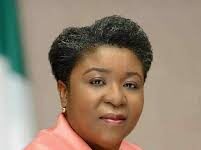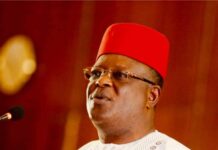COVID-19 And Looming Global Recession, Any Options For Nigeria?
POLITICS DIGEST – As COVID-19 continues to disrupt economic activities globally, and IMF predicting a global recession in the face of the pandemic, analysts are considering options available to Nigeria.
As the coronavirus pandemic continues to distort projections and forecast globally coupled with plunging oil prices ($26 per barrel) have set Nigeria on the path to a second recession in four years.
These twin problems threaten Nigeria’s budget implementation, especially given that the prevailing oil price is way below the benchmark price of $57 per barrel. This has implications for strategic investment decisions as well as worsening capital flows and foreign reserves, with dire consequences for Nigeria’s ability to meet external obligations, absorb shocks and prevent economic crisis.
Unfortunately, the government has very limited fiscal buffers with which to augment the anticipated shortfalls from oil revenue, given that the Excess Crude Account (ECA) is practically empty. Government is already reacting with a rash of fiscal and monetary policy measures, including reduction of the 2020 budget by N1.5tn, N1tn intervention fund for critical sectors of the economy, N1.5tn private sector infrastructure fund to link farming communities to markets, N100bn health intervention fund, etc.
Additional short-term and longer term policy measures that the government should adopt to try to stave off the impending crisis include: significant reduction in revenue leakages, elimination of petrol subsidy, institutional system and incentives to encourage transparency, as well as diversification of the economy
As the number of deaths and confirmed cases increased, the Chinese government, in a bid to control the spread locked down cities, quarantined millions of people and temporarily shut down factories and businesses. This targeted action resulted in a global supply chain disruption, a slowdown in the Chinese economy, and a sharp drop in China’s crude oil consumption. The drop is reported as the largest shock the oil market has suffered since the September 11, 2001 attack and the global financial crisis of 2008/2009.
With COVID-19 outbreak spreading to more countries, travel and broader economic activities are being constrained and global demand is weakening. Shutting down of flights by global airlines, across the globe compounded the oil slack. As at 24th of March 2020, there were 386,332 confirmed cases; 16,713 deaths and 102,333 recovered cases from the COVID-19 outbreak.
Squabble between OPEC+
The slowdown in the Chinese economy, coupled with the shutting down of flights resulted in a drop in the demand for crude oil, intensifying fears in the oil market and negatively impacting the aviation industry. The twin threat of an expanding COVID-19 outbreak and plunging oil prices forced OPEC to call for an emergency summit to deliberate on production cut in order to buoy the declining oil prices and the widening effect of the outbreak on global energy demand.
On the 5th of March, 2020, OPEC, led by Saudi Arabia agreed to cut oil production by 1.5 million barrels per day. This was to be shared between OPEC and non-OPEC members by a ratio of 2:1. The plan was to keep oil prices steady despite the fall in demand as COVID-19 slowed travel activities, manufacturing and global supply chains. However, on the 6th of March 2020 Russia, the cartel’s most crucial ally refused to participate in the discussion to cut production. Saudi Arabia in response, announced that it would ramp up its oil production, giving generous price discounts of between $6 and $8 per barrel to customers in Europe, Asia, and the US. The threat to flood world markets with cheap oil triggered a crash in oil prices, sent shockwaves through financial markets and rattled investors already reeling from panic driven by the global spread of the COVID-19.
According to the IMF, Saudi Arabia needs a price of $83 a barrel to balance its 2020 budget of $272 billion. Russia would need $50 a barrel to fund its annual budget and Nigeria had adopted a crude oil price benchmark of $57 per barrel to fund its 2020 budget. Oil price volatility and COVID-19 currently drive the global economy; hence the Nigerian government’s decision on the 16th of March, 2020 to reduce its 2020 annual budget by N1.5 trillion and introduce policy measures to manage the pandemic.
Options for Nigeria
Nigeria is vulnerable to a prolonged period of low oil price, and the option of quickly ramping up production is limited by operational, regulatory and infrastructure challenges. The decline in international oil prices adversely affects the inflow of foreign exchange into the country. While sectors such as agriculture, manufacturing, mining and quarrying, transportation and storage contribute to non-oil GDP, close to 90 per cent of Nigeria’s foreign exchange revenues still come from oil exports. The meltdown in the global oil market threatens Nigeria’s budget implementation, especially funding of capital projects. The price which is currently at $30 per barrel (way below the $57 per barrel benchmark for the 2020 budget) sparked a fresh wave of concerns on the implication for government’s economic projections for 2020. Oil price volatility can have impact on strategic investment decisions, and worsen capital flows and foreign reserves (which stood at $35.9 billion as at 20th of March 2020), with dire consequences for the country’s ability to meet external obligations, absorb shocks and prevent economic crisis.
Read Also:
The federal government recently reviewed the 2020 budget downward by N1.5 trillion as oil revenue came under severe pressure. The country is struggling to sell its crude as European and Chinese refiners cut demand due to tight margins and lower economic activity. According to the NNPC, over 50 Nigerian cargoes are yet to find buyers. Unfortunately, the Nigerian Government has very limited alternatives to buffer any shortfall from oil revenue, with the Excess Crude Account balance at a paltry $71.8 million as at 11 March 2020.
A short term policy measure
Reduction of revenue leakages: There is the need for aggressive revenue drive to mitigate the effects of the looming economic meltdown. An agreement between the Office of the Auditor General for the Federation (OAuGF) and the ICPC to audit the FIRS, NNPC and DPR in order to block all loopholes is a commendable one. The expected outcome is savings of about N100 billion annually. According to the 2017 audit report of the AuGF, about N1.5 trillion meant to be remitted into the federation account was deducted without authorisation, in violation of the provisions of the constitution. These deductions had impacted negatively on the funds available for allocation to the three tiers of government. Audits like this, should be extended to other government agencies and parastatals.
Stronger anti–corruption measures: It has become necessary to put in place measures, institutional systems and incentives to encourage transparency.
2020 budget rightsizing – Retaining only critical welfare-enhancing expenditure: On the 18th of March 2020 the Nigerian government made some significant changes to the 2020 budget which are part of measures to contain the effect of the looming economic meltdown. A 50 per cent cut in proposed revenue from privatization proceeds, 20 per cent cut in capital expenditures, and 25 per cent cut in recurrent expenditures was initiated. To achieve the government’s ambitious budget plan, a significant capital spending is required to drive economic growth, while improved earnings from investment in the real sector will help grow earnings from taxable revenues.
CBN policy
The CBN on Wednesday 18 March 2020 announced a N1tn intervention fund in all critical sectors of the economy, N100bn health sector intervention fund, and N1.5tn private sector infrastructure fund to link farming communities to markets. 6 policy measures were also taken to manage global supply chains and consequently impact on liquidity and growth prospects on the economy: all CBN intervention facilities were granted an additional year of moratorium; interest rates on all applicable CBN intervention facilities were reduced from 9.0% to 5.0% for a year; a N50bn targeted credit facility has been established for households and SMEs vulnerable to the COVID-19 pandemic; a loan and intervention facility has been up for expansion of pharmaceutical companies and setting up of drug manufacturing plants; restructuring of loans for businesses and households most affected by the outbreak of COVID-19; foreign exchange facilities to be granted to pharmaceutical companies to procure raw materials and equipment. These policies are geared towards freeing up more liquidity into the financial system and relaxing debt covenants for companies. They however, do not seem to take into consideration exchange rate concerns that will arise in the event of a prolonged oil price crash.
Global institutional responses
Airlines are forced to take drastic measures to stay afloat as the pandemic crashes travel demand. Airline stocks have tumbled globally as major carriers offer unpaid leaves of absence to some employees. The airline industry in the United States has requested for $50 billion bailout funds from the Trump administration. In Nigeria, restrictions have been placed on international travels to limit movement and the spread of the virus. Travel agencies in Nigeria are also requesting for financial aid to remain operational and retain their International Air Transport Association (IATA) licenses.
Impact on the GDP and stock market
The combined effects of the COVID-19 pandemic and oil price war is likely to push the Nigerian economy into recession, dragging full-year GDP growth down. The CBN has already swung into action with its rash of measures already detailed above. The apex bank announced at the end of its Monetary Policy Committee Meeting on 24th March, 2020 that it was leaving the policy rates unchanged at 13.5%. Unfortunately, the fiscal authorities are constrained to loosen the purse strings to try to stave off the looming recession given the near absence of fiscal buffers.
Pseudo-devaluation
As global demand for oil drops drastically, the naira is becoming unstable. A dollar crunch typically affects a wide range of businesses that require hard currency to fund importation of materials needed for production activities. The US dollar exchange rate on the parallel market initially went as high as 430 naira due to “excessive demand”, resulting from hoarding of the naira by BDC operators and activities of speculators. This came with damaging effects as businesses were unable to access dollars needed to import raw materials and households were unable to afford the hike in price of household items. The recent ‘adjustment of price’ by the CBN to peg the naira at $380 came after the impact of the oil price plunge spread across asset classes in Nigeria. This led investors to widen spreads in the bond market, selling off stocks and pilling pressure on the country’s foreign reserves.
Via: Blueprint

















